#transmediale
Text
My McLuhan lecture on enshittification
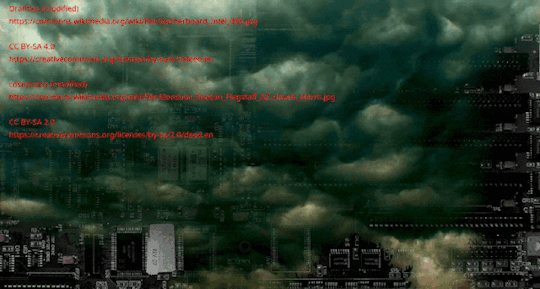
IT'S THE LAST DAY for the Kickstarter for the audiobook of The Bezzle, the sequel to Red Team Blues, narrated by @wilwheaton! You can pre-order the audiobook and ebook, DRM free, as well as the hardcover, signed or unsigned. There's also bundles with Red Team Blues in ebook, audio or paperback.

youtube
Last night, I gave the annual Marshall McLuhan lecture at the Transmediale festival in Berlin. The event was sold out and while there's a video that'll be posted soon, they couldn't get a streaming setup installed in the Canadian embassy, where the talk was held:
https://transmediale.de/en/2024/event/mcluhan-2024
The talk went of fabulously, and was followed by commentary from Frederike Kaltheuner (Human Rights Watch) and a discussion moderated by Helen Starr. While you'll have to wait a bit for the video, I thought that I'd post my talk notes from last night for the impatient among you.
I want to thank the festival and the embassy staff for their hard work on an excellent event. And now, on to the talk!
Last year, I coined the term 'enshittification,' to describe the way that platforms decay. That obscene little word did big numbers, it really hit the zeitgeist. I mean, the American Dialect Society made it their Word of the Year for 2023 (which, I suppose, means that now I'm definitely getting a poop emoji on my tombstone).
So what's enshittification and why did it catch fire? It's my theory explaining how the internet was colonized by platforms, and why all those platforms are degrading so quickly and thoroughly, and why it matters – and what we can do about it.
We're all living through the enshittocene, a great enshittening, in which the services that matter to us, that we rely on, are turning into giant piles of shit.
It's frustrating. It's demoralizing. It's even terrifying.
I think that the enshittification framework goes a long way to explaining it, moving us out of the mysterious realm of the 'great forces of history,' and into the material world of specific decisions made by named people – decisions we can reverse and people whose addresses and pitchfork sizes we can learn.
Enshittification names the problem and proposes a solution. It's not just a way to say 'things are getting worse' (though of course, it's fine with me if you want to use it that way. It's an English word. We don't have der Rat für Englisch Rechtschreibung. English is a free for all. Go nuts, meine Kerle).
But in case you want to use enshittification in a more precise, technical way, let's examine how enshittification works.
It's a three stage process: First, platforms are good to their users; then they abuse their users to make things better for their business customers; finally, they abuse those business customers to claw back all the value for themselves. Then, they die.
Let's do a case study. What could be better than Facebook?
Facebook is a company that was founded to nonconsensually rate the fuckability of Harvard undergrads, and it only got worse after that.
When Facebook started off, it was only open to US college and high-school kids with .edu and k-12.us addresses. But in 2006, it opened up to the general public. It told them: “Yes, I know you’re all using Myspace. But Myspace is owned by Rupert Murdoch, an evil, crapulent senescent Australian billionaire, who spies on you with every hour that God sends.
“Sign up with Facebook and we will never spy on you. Come and tell us who matters to you in this world, and we will compose a personal feed consisting solely of what those people post for consumption by those who choose to follow them.”
That was stage one. Facebook had a surplus — its investors’ cash — and it allocated that surplus to its end-users. Those end-users proceeded to lock themselves into FB. FB — like most tech businesses — has network effects on its side. A product or service enjoys network effects when it improves as more people sign up to use it. You joined FB because your friends were there, and then others signed up because you were there.
But FB didn’t just have high network effects, it had high switching costs. Switching costs are everything you have to give up when you leave a product or service. In Facebook’s case, it was all the friends there that you followed and who followed you. In theory, you could have all just left for somewhere else; in practice, you were hamstrung by the collective action problem.
It’s hard to get lots of people to do the same thing at the same time. You and your six friends here are going to struggle to agree on where to get drinks after tonight's lecture. How were you and your 200 Facebook friends ever gonna agree on when it was time to leave Facebook, and where to go?
So FB’s end-users engaged in a mutual hostage-taking that kept them glued to the platform. Then FB exploited that hostage situation, withdrawing the surplus from end-users and allocating it to two groups of business customers: advertisers, and publishers.
To the advertisers, FB said, 'Remember when we told those rubes we wouldn’t spy on them? We lied. We spy on them from asshole to appetite. We will sell you access to that surveillance data in the form of fine-grained ad-targeting, and we will devote substantial engineering resources to thwarting ad-fraud. Your ads are dirt cheap to serve, and we’ll spare no expense to make sure that when you pay for an ad, a real human sees it.'
To the publishers, FB said, 'Remember when we told those rubes we would only show them the things they asked to see? We lied!Upload short excerpts from your website, append a link, and we will nonconsensually cram it into the eyeballs of users who never asked to see it. We are offering you a free traffic funnel that will drive millions of users to your website to monetize as you please, and those users will become stuck to you when they subscribe to your feed.' And so advertisers and publishers became stuck to the platform, too, dependent on those users.
The users held each other hostage, and those hostages took the publishers and advertisers hostage, too, so that everyone was locked in.
Which meant it was time for the third stage of enshittification: withdrawing surplus from everyone and handing it to Facebook’s shareholders.
For the users, that meant dialing down the share of content from accounts you followed to a homeopathic dose, and filling the resulting void with ads and pay-to-boost content from publishers.
For advertisers, that meant jacking up prices and drawing down anti-fraud enforcement, so advertisers paid much more for ads that were far less likely to be seen by a person.
For publishers, this meant algorithmically suppressing the reach of their posts unless they included an ever-larger share of their articles in the excerpt, until anything less than fulltext was likely to be be disqualified from being sent to your subscribers, let alone included in algorithmic suggestion feeds.
And then FB started to punish publishers for including a link back to their own sites, so they were corralled into posting fulltext feeds with no links, meaning they became commodity suppliers to Facebook, entirely dependent on the company both for reach and for monetization, via the increasingly crooked advertising service.
When any of these groups squawked, FB just repeated the lesson that every tech executive learned in the Darth Vader MBA: 'I have altered the deal. Pray I don’t alter it any further.'
Facebook now enters the most dangerous phase of enshittification. It wants to withdraw all available surplus, and leave just enough residual value in the service to keep end users stuck to each other, and business customers stuck to end users, without leaving anything extra on the table, so that every extractable penny is drawn out and returned to its shareholders.
But that’s a very brittle equilibrium, because the difference between “I hate this service but I can’t bring myself to quit it,” and “Jesus Christ, why did I wait so long to quit? Get me the hell out of here!” is razor thin
All it takes is one Cambridge Analytica scandal, one whistleblower, one livestreamed mass-shooting, and users bolt for the exits, and then FB discovers that network effects are a double-edged sword.
If users can’t leave because everyone else is staying, when when everyone starts to leave, there’s no reason not to go, too.
That’s terminal enshittification, the phase when a platform becomes a pile of shit. This phase is usually accompanied by panic, which tech bros euphemistically call 'pivoting.'
Which is how we get pivots like, 'In the future, all internet users will be transformed into legless, sexless, low-polygon, heavily surveilled cartoon characters in a virtual world called "metaverse," that we ripped off from a 25-year-old satirical cyberpunk novel.'
That's the procession of enshittification. If enshittification were a disease, we'd call that enshittification's "natural history." But that doesn't tell you how the enshittification works, nor why everything is enshittifying right now, and without those details, we can't know what to do about it.
What led to the enshittocene? What is it about this moment that led to the Great Enshittening? Was it the end of the Zero Interest Rate Policy? Was it a change in leadership at the tech giants? Is Mercury in retrograde?
None of the above.
The period of free fed money certainly led to tech companies having a lot of surplus to toss around. But Facebook started enshittifying long before ZIRP ended, so did Amazon, Microsoft and Google.
Some of the tech giants got new leaders. But Google's enshittification got worse when the founders came back to oversee the company's AI panic (excuse me, 'AI pivot').
And it can't be Mercury in retrograde, because I'm a cancer, and as everyone knows, cancers don't believe in astrology.
When a whole bunch of independent entities all change in the same way at once, that's a sign that the environment has changed, and that's what happened to tech.
Tech companies, like all companies, have conflicting imperatives. On the one hand, they want to make money. On the other hand, making money involves hiring and motivating competent staff, and making products that customers want to buy. The more value a company permits its employees and customers to carve off, the less value it can give to its shareholders.
The equilibrium in which companies produce things we like in honorable ways at a fair price is one in which charging more, worsening quality, and harming workers costs more than the company would make by playing dirty.
There are four forces that discipline companies, serving as constraints on their enshittificatory impulses.
First: competition. Companies that fear you will take your business elsewhere are cautious about worsening quality or raising prices.
Second: regulation. Companies that fear a regulator will fine them more than they expect to make from cheating, will cheat less.
These two forces affect all industries, but the next two are far more tech-specific.
Third: self-help. Computers are extremely flexible, and so are the digital products and services we make from them. The only computer we know how to make is the Turing-complete Von Neumann machine, a computer that can run every valid program.
That means that users can always avail themselves of programs that undo the anti-features that shift value from them to a company's shareholders. Think of a board-room table where someone says, 'I've calculated that making our ads 20% more invasive will net us 2% more revenue per user.'
In a digital world, someone else might well say 'Yes, but if we do that, 20% of our users will install ad-blockers, and our revenue from those users will drop to zero, forever.'
This means that digital companies are constrained by the fear that some enshittificatory maneuver will prompt their users to google, 'How do I disenshittify this?'
Fourth and finally: workers. Tech workers have very low union density, but that doesn't mean that tech workers don't have labor power. The historical "talent shortage" of the tech sector meant that workers enjoyed a lot of leverage over their bosses. Workers who disagreed with their bosses could quit and walk across the street and get another job – a better job.
They knew it, and their bosses knew it. Ironically, this made tech workers highly exploitable. Tech workers overwhelmingly saw themselves as founders in waiting, entrepreneurs who were temporarily drawing a salary, heroic figures of the tech mission.
That's why mottoes like Google's 'don't be evil' and Facebook's 'make the world more open and connected' mattered: they instilled a sense of mission in workers. It's what Fobazi Ettarh calls 'vocational awe, 'or Elon Musk calls being 'extremely hardcore.'
Tech workers had lots of bargaining power, but they didn't flex it when their bosses demanded that they sacrifice their health, their families, their sleep to meet arbitrary deadlines.
So long as their bosses transformed their workplaces into whimsical 'campuses,' with gyms, gourmet cafeterias, laundry service, massages and egg-freezing, workers could tell themselves that they were being pampered – rather than being made to work like government mules.
But for bosses, there's a downside to motivating your workers with appeals to a sense of mission, namely: your workers will feel a sense of mission. So when you ask them to enshittify the products they ruined their health to ship, workers will experience a sense of profound moral injury, respond with outrage, and threaten to quit.
Thus tech workers themselves were the final bulwark against enshittification,
The pre-enshittification era wasn't a time of better leadership. The executives weren't better. They were constrained. Their worst impulses were checked by competition, regulation, self-help and worker power.
So what happened?
One by one, each of these constraints was eroded until it dissolved, leaving the enshittificatory impulse unchecked, ushering in the enshittoscene.
It started with competition. From the Gilded Age until the Reagan years, the purpose of competition law was to promote competition. US antitrust law treated corporate power as dangerous and sought to blunt it. European antitrust laws were modeled on US ones, imported by the architects of the Marshall Plan.
But starting in the neoliberal era, competition authorities all over the world adopted a doctrine called 'consumer welfare,' which held that monopolies were evidence of quality. If everyone was shopping at the same store and buying the same product, that meant it was the best store, selling the best product – not that anyone was cheating.
And so all over the world, governments stopped enforcing their competition laws. They just ignored them as companies flouted them. Those companies merged with their major competitors, absorbed small companies before they could grow to be big threats. They held an orgy of consolidation that produced the most inbred industries imaginable, whole sectors grown so incestuous they developed Habsburg jaws, from eyeglasses to sea freight, glass bottles to payment processing, vitamin C to beer.
Most of our global economy is dominated by five or fewer global companies. If smaller companies refuse to sell themselves to these cartels, the giants have free rein to flout competition law further, with 'predatory pricing' that keeps an independent rival from gaining a foothold.
When Diapers.com refused Amazon's acquisition offer, Amazon lit $100m on fire, selling diapers way below cost for months, until diapers.com went bust, and Amazon bought them for pennies on the dollar, and shut them down.
Competition is a distant memory. As Tom Eastman says, the web has devolved into 'five giant websites filled with screenshots of text from the other four,' so these giant companies no longer fear losing our business.
Lily Tomlin used to do a character on the TV show Laugh In, an AT&T telephone operator who'd do commercials for the Bell system. Each one would end with her saying 'We don't care. We don't have to. We're the phone company.'
Today's giants are not constrained by competition.
They don't care. They don't have to. They're Google.
That's the first constraint gone, and as it slipped away, the second constraint – regulation – was also doomed.
When an industry consists of hundreds of small- and medium-sized enterprises, it is a mob, a rabble. Hundreds of companies can't agree on what to tell Parliament or Congress or the Commission. They can't even agree on how to cater a meeting where they'd discuss the matter.
But when a sector dwindles to a bare handful of dominant firms, it ceases to be a rabble and it becomes a cartel.
Five companies, or four, or three, or two, or just one company finds it easy to converge on a single message for their regulators, and without "wasteful competition" eroding their profits, they have plenty of cash to spread around.
Like Facebook, handing former UK deputy PM Nick Clegg millions every year to sleaze around Europe, telling his former colleagues that Facebook is the only thing standing between 'European Cyberspace' and the Chinese Communist Party.
Tech's regulatory capture allows it to flout the rules that constrain less concentrated sectors. They can pretend that violating labor, consumer and privacy laws is fine, because they violate them with an app.
This is why competition matters: it's not just because competition makes companies work harder and share value with customers and workers, it's because competition keeps companies from becoming too big to fail, and too big to jail.
Now, there's plenty of things we don't want improved through competition, like privacy invasions. After the EU passed its landmark privacy law, the GDPR, there was a mass-extinction event for small EU ad-tech companies. These companies disappeared en masse, and that's fine.
They were even more invasive and reckless than US-based Big Tech companies. After all, they had less to lose. We don't want competition in commercial surveillance. We don't want to produce increasing efficiency in violating our human rights.
But: Google and Facebook – who pretend they are called Alphabet and Meta – have been unscathed by European privacy law. That's not because they don't violate the GDPR (they do!). It's because they pretend they are headquartered in Ireland, one of the EU's most notorious corporate crime-havens.
And Ireland competes with the EU other crime havens – Malta, Luxembourg, Cyprus and sometimes the Netherlands – to see which country can offer the most hospitable environment for all sorts of crimes. Because the kind of company that can fly an Irish flag of convenience is mobile enough to change to a Maltese flag if the Irish start enforcing EU laws.
Which is how you get an Irish Data Protection Commission that processes fewer than 20 major cases per year, while Germany's data commissioner handles more than 500 major cases, even though Ireland is nominal home to the most privacy-invasive companies on the continent.
So Google and Facebook get to act as though they are immune to privacy law, because they violate the law with an app; just like Uber can violate labor law and claim it doesn't count because they do it with an app.
Uber's labor-pricing algorithm offers different drivers different payments for the same job, something Veena Dubal calls 'algorithmic wage discrimination.' If you're more selective about which jobs you'll take, Uber will pay you more for every ride.
But if you take those higher payouts and ditch whatever side-hustle let you cover your bills which being picky about your Uber drives, Uber will incrementally reduce the payment, toggling up and down as you grow more or less selective, playing you like a fish on a line until you eventually – inevitably – lose to the tireless pricing robot, and end up stuck with low wages and all your side-hustles gone.
Then there's Amazon, which violates consumer protection laws, but says it doesn't matter, because they do it with an app. Amazon makes $38b/year from its 'advertising' system. 'Advertising' in quotes because they're not selling ads, they're selling placements in search results.
The companies that spend the most on 'ads' go to the top, even if they're offering worse products at higher prices. If you click the first link in an Amazon search result, on average you will pay a 29% premium over the best price on the service. Click one of the first four items and you'll pay a 25% premium. On average you have to go seventeen items down to find the best deal on Amazon.
Any merchant that did this to you in a physical storefront would be fined into oblivion. But Amazon has captured its regulators, so it can violate your rights, and say, "it doesn't count, we did it with an app"
This is where that third constraint, self-help, would sure come in handy. If you don't want your privacy violated, you don't need to wait for the Irish privacy regulator to act, you can just install an ad-blocker.
More than half of all web users are blocking ads. But the web is an open platform, developed in the age when tech was hundreds of companies at each others' throats, unable to capture their regulators.
Today, the web is being devoured by apps, and apps are ripe for enshittification. Regulatory capture isn't just the ability to flout regulation, it's also the ability to co-opt regulation, to wield regulation against your adversaries.
Today's tech giants got big by exploiting self-help measures. When Facebook was telling Myspace users they needed to escape Rupert Murdoch’s evil crapulent Australian social media panopticon, it didn’t just say to those Myspacers, 'Screw your friends, come to Facebook and just hang out looking at the cool privacy policy until they get here'
It gave them a bot. You fed the bot your Myspace username and password, and it would login to Myspace and pretend to be you, and scrape everything waiting in your inbox, copying it to your FB inbox, and you could reply to it and it would autopilot your replies back to Myspace.
When Microsoft was choking off Apple's market oxygen by refusing to ship a functional version of Microsoft Office for the Mac – so that offices were throwing away their designers' Macs and giving them PCs with upgraded graphics cards and Windows versions of Photoshop and Illustrator – Steve Jobs didn't beg Bill Gates to update Mac Office.
He got his technologists to reverse-engineer Microsoft Office, and make a compatible suite, the iWork Suite, whose apps, Pages, Numbers and Keynote could perfectly read and write Microsoft's Word, Excel and Powerpoint files.
When Google entered the market, it sent its crawler to every web server on Earth, where it presented itself as a web-user: 'Hi! Hello! Do you have any web pages? Thanks! How about some more? How about more?'
But every pirate wants to be an admiral. When Facebook, Apple and Google were doing this adversarial interoperability, that was progress. If you try to do it to them, that's piracy.
Try to make an alternative client for Facebook and they'll say you violated US laws like the Digital Millennium Copyright Act and EU laws like Article 6 of the EUCD.
Try to make an Android program that can run iPhone apps and play back the data from Apple's media stores and they'd bomb you until the rubble bounced.
Try to scrape all of Google and they'll nuke you until you glowed.
Tech's regulatory capture is mind-boggling. Take that law I mentioned earlier, Section 1201 of the Digital Millennium Copyright Act or DMCA. Bill Clinton signed it in 1998, and the EU imported it as Article 6 of the EUCD in 2001
It is a blanket prohibition on removing any kind of encryption that restricts access to a copyrighted work – things like ripping DVDs or jailbreaking a phone – with penalties of a five-year prison sentence and a $500k fine for a first offense.
This law has been so broadened that it can be used to imprison creators for granting access to their own creations
Here's how that works: In 2008, Amazon bought Audible, an audiobook platform, in an anticompetitive acquisition. Today, Audible is a monopolist with more than 90% of the audiobook market. Audible requires that all creators on their platform sell with Amazon's "digital rights management," which locks it to Amazon's apps.
So say I write a book, then I read it into a mic, then I pay a director and an engineer thousands of dollars to turn that into an audiobook, and sell it to you on the monopoly platform, Audible, that controls more than 90% of the market.
If I later decide to leave Amazon and want to let you come with me to a rival platform, I am out of luck. If I supply you with a tool to remove Amazon's encryption from my audiobook, so you can play it in another app, I commit a felony, punishable by a 5-year sentence and a half-million-dollar fine, for a first offense.
That's a stiffer penalty than you would face if you simply pirated the audiobook from a torrent site. But it's also harsher than the punishment you'd get for shoplifting the audiobook on CD from a truck-stop. It's harsher than the sentence you'd get for hijacking the truck that delivered the CD.
So think of our ad-blockers again. 50% of web users are running ad-blockers. 0% of app users are running ad-blockers, because adding a blocker to an app requires that you first remove its encryption, and that's a felony (Jay Freeman calls this 'felony contempt of business-model').
So when someone in a board-room says, 'let's make our ads 20% more obnoxious and get a 2% revenue increase,' no one objects that this might prompt users to google, 'how do I block ads?' After all, the answer is, 'you can't.'
Indeed, it's more likely that someone in that board room will say, 'let's make our ads 100% more obnoxious and get a 10% revenue increase' (this is why every company wants you to install an app instead of using its website).
There's no reason that gig workers who are facing algorithmic wage discrimination couldn't install a counter-app that coordinated among all the Uber drivers to reject all jobs unless they reach a certain pay threshold.
No reason except felony contempt of business model, the threat that the toolsmiths who built that counter-app would go broke or land in prison, for violating DMCA 1201, the Computer Fraud and Abuse Act, trademark, copyright, patent, contract, trade secrecy, nondisclosure and noncompete, or in other words: 'IP law.'
'IP' is just a euphemism for 'a law that lets me reach beyond the walls of my company and control the conduct of my critics, competitors and customers.' And 'app' is just a euphemism for 'a web-page wrapped enough IP to make it a felony to mod it to protect the labor, consumer and privacy rights of its user.'
We don't care. We don't have to. We're the phone company.
But what about that fourth constraint: workers?
For decades, tech workers' high degrees of bargaining power and vocational awe put a ceiling on enshittification. Even after the tech sector shrank to a handful of giants. Even after they captured their regulators so they could violate our consumer, privacy and labor rights. Even after they created 'felony contempt of business model' and extinguished self-help for tech users. Tech was still constrained by their workers' sense of moral injury in the face of the imperative to enshittify.
Remember when tech workers dreamed of working for a big company for a few years, before striking out on their own to start their own company that would knock that tech giant over?
Then that dream shrank to: work for a giant for a few years, quit, do a fake startup, get acqui-hired by your old employer, as a complicated way of getting a bonus and a promotion.
Then the dream shrank further: work for a tech giant for your whole life, get free kombucha and massages on Wednesdays.
And now, the dream is over. All that’s left is: work for a tech giant until they fire your ass, like those 12,000 Googlers who got fired last year six months after a stock buyback that would have paid their salaries for the next 27 years.
Workers are no longer a check on their bosses' worst impulses
Today, the response to 'I refuse to make this product worse' is, 'turn in your badge and don't let the door hit you in the ass on the way out.'
I get that this is all a little depressing
OK, really depressing.
But hear me out! We've identified the disease. We've traced its natural history. We've identified its underlying mechanism. Now we can get to work on a cure.
There are four constraints that prevent enshittification: competition, regulation, self-help and labor.
To reverse enshittification and guard against its reemergence, we must restore and strengthen each of these.
On competition, it's actually looking pretty good. The EU, the UK, the US, Canada, Australia, Japan and China are all doing more on competition than they have in two generations. They're blocking mergers, unwinding existing ones, taking action on predatory pricing and other sleazy tactics.
Remember, in the US and Europe, we already have the laws to do this – we just stopped enforcing them in the Helmut Kohl era.
I've been fighting these fights with the Electronic Frontier Foundation for 22 years now, and I've never seen a more hopeful moment for sound, informed tech policy.
Now, the enshittifiers aren't taking this laying down. The business press can't stop talking about how stupid and old-fashioned all this stuff is. They call people like me 'hipster antitrust,' and they hate any regulator who actually does their job.
Take Lina Khan, the brilliant head of the US Federal Trade Commission, who has done more in three years on antitrust than the combined efforts of all her predecessors over the past 40 years. Rupert Murdoch's Wall Street Journal has run more than 80 editorials trashing Khan, insisting that she's an ineffectual ideologue who can't get anything done.
Sure, Rupert, that's why you ran 80 editorials about her.
Because she can't get anything done.
Even Canada is stepping up on competition. Canada! Land of the evil billionaire! From Ted Rogers, who owns the country's telecoms; to Galen Weston, who owns the country's grocery stores; to the Irvings, who basically own the entire province of New Brunswick.
Even Canada is doing something about this. Last autumn, Trudeau's government promised to update Canada's creaking competition law to finally ban 'abuse of dominance.'
I mean, wow. I guess when Galen Weston decided to engage in a criminal conspiracy to fix the price of bread – the most Les Miz-ass crime imaginable – it finally got someone's attention, eh?
Competition has a long way to go, but all over the world, competition law is seeing a massive revitalization. Ronald Reagan and Margaret Thatcher put antitrust law in a coma in the 80s – but it's awake, it's back, and it's pissed.
What about regulation? How will we get tech companies to stop doing that one weird trick of adding 'with an app' to their crimes and escaping enforcement?
Well, here in the EU, they're starting to figure it out. This year, the Digital Markets Act and the Digital Services Act went into effect, and they let people who get screwed by tech companies go straight to the federal European courts, bypassing the toothless watchdogs in Europe's notorious corporate crime havens like Ireland.
In America, they might finally get a digital privacy law. You people have no idea how backwards US privacy law is. The last time the US Congress enacted a broadly applicable privacy law was in 1988.
The Video Privacy Protection Act makes it a crime for video-store clerks to leak your video-rental history. It was passed after a right-wing judge who was up for the Supreme Court had his rentals published in a DC newspaper. The rentals weren't even all that embarrassing!
Sure, that judge, Robert Bork, wasn't confirmed for the Supreme Court, but that was because he was a virulently racist loudmouth and a crook who served as Nixon's Solicitor General.
But Congress got the idea that their video records might be next, freaked out, and passed the VPPA.
That was the last time Americans got a big, national privacy law. Nineteen. Eighty. Eight.
It's been a minute.
And the thing is, there's a lot of people who are angry about stuff that has some nexus with America's piss-poor privacy landscape. Worried that Facebook turned Grampy into a Qanon? That Insta made your teen anorexic? That TikTok is brainwashing millennials into quoting Osama Bin Laden?
Or that cops are rolling up the identities of everyone at a Black Lives Matter protest or the Jan 6 riots by getting location data from Google?
Or that Red State Attorneys General are tracking teen girls to out-of-state abortion clinics?
Or that Black people are being discriminated against by online lending or hiring platforms?
Or that someone is making AI deepfake porn of you?
Having a federal privacy law with a private right of action – which means that individuals can sue companies that violate their privacy – would go a long way to rectifying all of these problems. There's a big coalition for that kind of privacy law.
What about self-help? That's a lot farther away, alas.
The EU's DMA will force tech companies to open up their walled gardens for interoperation. You'll be able to use Whatsapp to message people on iMessage, or quit Facebook and move to Mastodon, but still send messages to the people left behind.
But if you want to reverse-engineer one of those Big Tech products and mod it to work for you, not them, the EU's got nothing for you.
This is an area ripe for improvement, and I think the US might be the first ones to open this up.
It's certainly on-brand for the EU to be forcing tech companies to do things a certain way, while the US simply takes away tech companies' abilities to prevent others from changing how their stuff works.
My big hope here is that Stein's Law will take hold: 'Anything that can't go on forever will eventually stop'
Letting companies decide how their customers must use their products is simply too tempting an invitation to mischief. HP has a whole building full of engineers thinking of new ways to lock your printer to its official ink cartridges, forcing you to spend $10,000/gallon on ink to print your boarding passes and shopping lists.
It's offensive. The only people who don't agree are the people running the monopolies in all the other industries, like the med-tech monopolists who are locking their insulin pumps to their glucose monitors, turning people with diabetes into walking inkjet printers.
Finally, there's labor. Here in Europe, there's much higher union density than in the US, which American tech barons are learning the hard way. There is nothing more satisfying in the daily news than the latest salvo by Nordic unions against that Tesla guy (Musk is the most Edison-ass Tesla guy imaginable).
But even in the USA, there's a massive surge in tech unions. Tech workers are realizing that they aren't founders in waiting. The days of free massages and facial piercings and getting to wear black tee shirts that say things your boss doesn't understand are coming to an end.
In Seattle, Amazon's tech workers walked out in sympathy with Amazon's warehouse workers, because they're all workers.
The only reason the tech workers aren't monitored by AI that notifies their managers if they visit the toilet during working hours is their rapidly dwindling bargaining power. The way things are going, Amazon programmers are going to be pissing in bottles next to their workstations (for a guy who built a penis-shaped rocket, Jeff Bezos really hates our kidneys).
We're seeing bold, muscular, global action on competition, regulation and labor, with self-help bringing up the rear. It's not a moment too soon, because the bad news is, enshittification is coming to every industry.
If it's got a networked computer in it, the people who made it can run the Darth Vader MBA playbook on it, changing the rules from moment to moment, violating your rights and then saying 'It's OK, we did it with an app.'
From Mercedes renting you your accelerator pedal by the month to Internet of Things dishwashers that lock you into proprietary dishsoap, enshittification is metastasizing into every corner of our lives.
Software doesn't eat the world, it enshittifies it
But there's a bright side to all this: if everyone is threatened by enshittification, then everyone has a stake in disenshittification.
Just as with privacy law in the US, the potential anti-enshittification coalition is massive, it's unstoppable.
The cynics among you might be skeptical that this will make a difference. After all, isn't "enshittification" the same as "capitalism"?
Well, no.
Look, I'm not going to cape for capitalism here. I'm hardly a true believer in markets as the most efficient allocators of resources and arbiters of policy – if there was ever any doubt, capitalism's total failure to grapple with the climate emergency surely erases it.
But the capitalism of 20 years ago made space for a wild and wooly internet, a space where people with disfavored views could find each other, offer mutual aid, and organize.
The capitalism of today has produced a global, digital ghost mall, filled with botshit, crapgadgets from companies with consonant-heavy brand-names, and cryptocurrency scams.
The internet isn't more important than the climate emergency, nor gender justice, racial justice, genocide, or inequality.
But the internet is the terrain we'll fight those fights on. Without a free, fair and open internet, the fight is lost before it's joined.
We can reverse the enshittification of the internet. We can halt the creeping enshittification of every digital device.
We can build a better, enshittification-resistant digital nervous system, one that is fit to coordinate the mass movements we will need to fight fascism, end genocide, and save our planet and our species.
Martin Luther King said 'It may be true that the law cannot make a man love me, but it can stop him from lynching me, and I think that's pretty important.'
And it may be true that the law can't force corporate sociopaths to conceive of you as a human being entitled to dignity and fair treatment, and not just an ambulatory wallet, a supply of gut-bacteria for the immortal colony organism that is a limited liability corporation.
But it can make that exec fear you enough to treat you fairly and afford you dignity, even if he doesn't think you deserve it.
And I think that's pretty important.

If you'd like an essay-formatted version of this post to read or share, here's a link to it on pluralistic.net, my surveillance-free, ad-free, tracker-free blog:
https://pluralistic.net/2024/01/30/go-nuts-meine-kerle#ich-bin-ein-bratapfel/a>

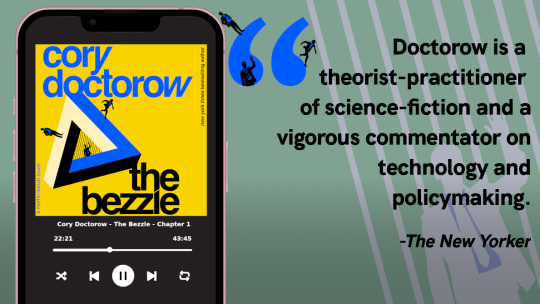
Back the Kickstarter for the audiobook of The Bezzle here!

Image:
Drahtlos (modified)
https://commons.wikimedia.org/wiki/File:Motherboard_Intel_386.jpg
CC BY-SA 4.0
https://creativecommons.org/licenses/by-sa/4.0/deed.en
-
cdessums (modified)
https://commons.wikimedia.org/wiki/File:Monsoon_Season_Flagstaff_AZ_clouds_storm.jpg
CC BY-SA 2.0
https://creativecommons.org/licenses/by-sa/2.0/deed.en
401 notes
·
View notes
Text
▱ HyperBody: Vampyroteuthis Infernalis, VR gameplay, Berlin, Germany, 2020
"幽靈蛸"
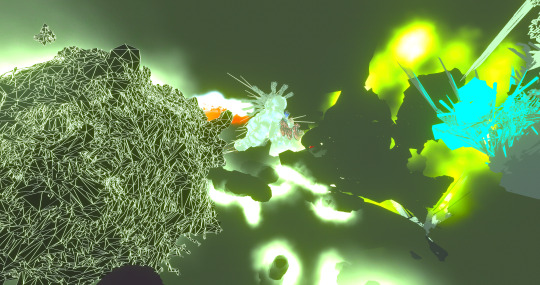
ܫ
⤦ github
⤦ transmediale
☇
0 notes
Text
That was crazy. Although it was the first set of the evening, the large room filled up quickly — massive thanks to everyone there. I loved the vibe! You went with me through all the edges of BASS music! You ROCK!
And big up to the DJs who played after me, perfect fit!
blastah (https://soundcloud.com/blastahlx)
and _upsammy from Netherlands
Festival page: https://www.ctm-festival.de/festival-2024/programme/schedule/event/rso-night-robus
1 note
·
View note
Text
I think a lot about water, in this time. […] Whisperings of rivers that greet the sea. The currents [...]. The saltiness of estuaries that ebb through the roots of mangroves. Waters that return to themselves, always different, streaming off, merging back, sinking in. […]
To refuse is usually understood as being-against: the Bartleby-an preference not to; refusal as strike, occupation, boycott, cancellation, retaliation, resistance, from passive evasions to spectacles of revolution. The no of refusal is a mode of survival: an impenetrable boundary, silent or shouted. It is a refusal to be killed or to succumb: the Indigenous refusal of colonial recognition, the Black refusal of white erasure and enclosure. But before refusal as dialectic, in the now unused meaning found in common Latin, refusal also meant to give back, to restore, to return.
Derived from re-, “back”, and fundere-, “to pour”, this meaning fell out of use, likely because conversational Latin was not transcribed but comprised of evolving and diverging dialects […]. The addition of refusal as return – a definition always already slipping away, consigned to hearsay and archival traces – disarranges refusal’s march towards the future [...]. An understanding of refusal as return [...] unsettles narratives of resistance that are framed only in opposition. [...] The idea of pouring back or watering expands the conceptualisation of refusal as an act of liberation. Refusal as return swells refusal’s imagination-otherwise [...]. Vast ecosystems flattened for plantations [...], raw minerals pulled from the ground and sea for the building of [...] war [...]. The ordering of land into resource [...] has been arbitrated by those who profit [...]. Return disavows final consolidation [...]. On the contrary, the past illuminates the limitations of capitalist time and the fallibility of colonial history. Return is a reckoning with what is presumed to be universal. [...]
As well as the being-against of refusal, return allows for a being-with, a sitting-with. [...] A return is an invitation to humble oneself to another approach. Being-with requires a pause from which to imagine otherwise, in all of its vastness and uncertainty. It is a moment between, where one is asked to hold onto many possibilities at once.
To be-with [...] needs a disposition of attentiveness, [...] an attunement, following I-Kiribati poet and thinker Teweiariki Teaero when he says, “two ears, one mouth, don’t talk too much. Learn to listen more,” or Fijian academic Unaisi Nabobo-Baba when she speaks of silence as a “pedagogy of deep engagement”. [...]
The immensity of the loss of people and ecologies to capitalist brutalities exceeds what we can comprehend. But as Indigenous and Black Studies scholars, artists, and ecologists show, so do the myriad, and insuppressible flourishings and alliances, the joyfulness and love, the lives lived otherways. Attunement leads us to the gaps and silences and soundings that run through everything, that connect the earth and all who live and die.
---
Text by: AM Kanngieser. “To undo nature; on refusal as return.” transmediale. 2021.
30 notes
·
View notes
Text
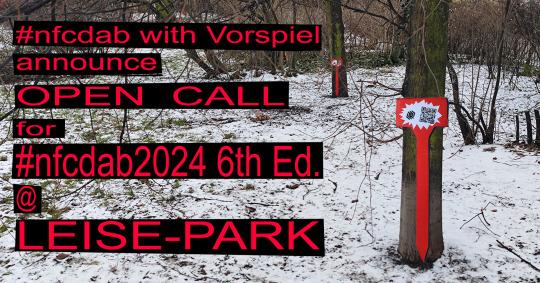
(ENG) Auf Deutsch unten
#nfcdab2024 “Leise-Park” 6th Ed. Berlin
Near-Field Communication Digital Art Biennale aka #nfcdab
#nfcdab is a DIY or DIWO [DO IT WITH OTHER]? Digital art biennale that travels on wireless technologies, light waves and electromagnetic fields e.g.: Wi-Fi routers, QR codes or NFC tags to access content. the idea of the biennale is to take advantage of the potential of near-field (mis)communication[sic!] and other sharing technologies for making web-based digital art accessible in outdoors settings. it slack-keeps presence next to the frameworks of galleries and institutions.
Hashtag: #nfcdab #nfcdab2024
Open call:
for online artists
link to facebook event: https://fb.me/e/1MHZXhXzO
Project title:
"Leise-Park".
Project description:
We invite online artists to participate in our disturbing project entitled "Leise-Park". In this project, we want to explore the issue of silence as an opposition to the anxiety we may feel in the context of the development of various digital trends and Internet technologies. The pervasive availability of mobile devices for spreading content and ideas through all types of Internet-based media, creates a sense of loss of self-control resulting from the pervasive information chaos. Our beloved smartphones are beginning to turn us into a kind of zombie addicted to absorbing information content from the Internet. What consequences does this have for us as well as for further social evolution? Do the emotions that accompany us at this moment allow us to analyze this phenomenon. Can we face this new reality? Can artists help us understand what currently surrounds and shapes us. Can we find distance from the world around us and calm down, or will we become technological zombies? That's why in the “Leise-Park” project we want to ask this question to artists who are willing to take part in our project with their work. Like all our projects this one too is based on the idea of DIY and DIWO.
We often think of the park as a place with sculptures, traditionally made of stone, here those sculptures are to be works displayed on the smartphones of the show's viewers. Access to the links via a poster with a QR code pasted on a cardboard presenter cut to resemble a plant plaque. Presenters with the artists' works will be placed at various locations in Leise-Park. The show will run from February 2 - 4, 2024 and is part of the Vorspiel project, which is an initiative of transmediale and CTM Festival to showcase the richness and diversity of Berlin. So we invite you, as part of our project, to a creative exploration of a former Berlin cemetery turned into a publicly accessible Leise-Park.
The events were organized in cooperation by #nfcdab - Dominik Podsiadly, noemata - Bjørn Magnhildøen, BrowserBased - Zsolt Mesterhazy
Place:
Leise-Park Heinrich-Roller-Straße 24, 10405 Berlin (DE)
Date:
Vernissage: 2 February 2024 2.00 PM
Open: 2 – 4 February 2024, 8.00 AM - 8.00 PM
Technical requirements:
In short about submission: we would like to show the art works that can be implemented on QR CODE and can be displayed on mobile devices eg. links to websites(YouTube, Tumblr, Soundcloud to name a few), short texts and little ASCII art, links to personal web pages, art app, games or arts hacks. We would like to present all type of art expression and intellectual invention.
Deadline:
▓ January 27 2024
Submission Guidelines:
▓ add subject: “Leise-Park” - required
▓ send an image or PDF file or (*.zip or link to download) to our email: [email protected]
▓ feel free to add some short info in pdf max 500 characters
Image Guidelines:
▓ depth – Black & White only
▓ print dimension – A4, landscape
QR Code Guidelines:
▓ all type of qr & bar codes
▓ readable in popular mobile apps
▓ attached data, example: links, text, images
▓ we love custom art and free modifications (look point above)
More Info:
▓ blog: https://nfcdab.org/
▓ fb page: https://www.facebook.com/nfcdab/
▓ fb open group: https://web.facebook.com/groups/1nfcdabiennale/
(DE)
#nfcdab2024 “Leise-Park” 6th Ed. Berlin
Near-Field Communication Digital Art Biennale aka #nfcdab
#nfcdab ist eine DIY oder DIWO [DO IT WITH OTHER]? Digitale Kunstbiennale, die sich auf drahtlose Technologien, Lichtwellen und elektromagnetische Felder stützt, z.B.: Wi-Fi-Router, QR-Codes oder NFC-Tags, um auf Inhalte zuzugreifen. Die Idee der Biennale ist es, das Potenzial der near-field (mis)communication[sic!] und anderer Sharing-Technologien zu nutzen, um webbasierte digitale Kunst in Außenbereichen zugänglich zu machen. Sie bleibt locker neben dem Rahmen von Galerien und Institutionen präsent.
Hashtag: #nfcdab #nfcdab2024
Offener Aufruf:
für Webkünstler
Link zur Facebook-Veranstaltung: https://fb.me/e/1MHZXhXzO
Projekttitel:
"Leise-Park"
Projektbeschreibung:
Wir laden Online-Künstler ein, sich an unserem beunruhigenden Projekt mit dem Titel "Leise-Park" zu beteiligen. In diesem Projekt wollen wir die Frage der Stille als Gegenpol zu der Angst erforschen, die wir im Zusammenhang mit der Entwicklung verschiedener digitaler Trends und Internettechnologien empfinden können. Die allgegenwärtige Verfügbarkeit mobiler Geräte zur Verbreitung von Inhalten und Ideen über alle Arten von internetbasierten Medien führt zu einem Gefühl des Verlusts der Selbstkontrolle, das aus dem allgegenwärtigen Informationschaos resultiert. Unsere geliebten Smartphones verwandeln uns allmählich in eine Art Zombie, der süchtig nach der Aufnahme von Informationsinhalten aus dem Internet ist. Welche Folgen hat das für uns und für die weitere gesellschaftliche Entwicklung? Erlauben uns die Emotionen, die uns in diesem Moment begleiten, dieses Phänomen zu analysieren? Können wir uns dieser neuen Realität stellen? Können Künstler uns helfen zu verstehen, was uns derzeit umgibt und prägt? Können wir Abstand von der Welt um uns herum gewinnen und zur Ruhe kommen, oder werden wir zu technologischen Zombies? Deshalb wollen wir im Projekt „Leise-Park“ diese Frage an Künstlerinnen und Künstler stellen, die bereit sind, sich mit ihrer Arbeit an unserem Projekt zu beteiligen. Wie alle unsere Projekte basiert auch dieses auf der Idee von DIY und DIWO.
Wir denken oft an den Park als einen Ort mit Skulpturen, traditionell aus Stein, hier sollen diese Skulpturen Werke sein, die auf den Smartphones der Betrachter der Ausstellung angezeigt werden. Der Zugang zu den Links erfolgt über ein Poster mit einem QR-Code, der auf einen Präsenter aus Pappe geklebt ist, der wie eine Pflanzenstecker aussieht. Die Präsenter mit den Werken der Künstler werden an verschiedenen Orten im Leise-Park aufgestellt. Die Ausstellung läuft vom 2. bis 4. Februar 2024 und ist Teil des Projekts Vorspiel, einer Initiative der transmediale und des CTM Festivals, um den Reichtum und die Vielfalt Berlins zu präsentieren. So laden wir Sie als Teil unseres Projekts zu einer kreativen Erkundung eines ehemaligen Berliner Friedhofs ein, der in einen öffentlich zugänglichen Leise-Park umgewandelt wurde.
Die Veranstaltungen wurden in Zusammenarbeit von #nfcdab - Dominik Podsiadly, noemata - Bjørn Magnhildøen, BrowserBased - Zsolt Mesterhazy organisiert
Ort:
Leise-Park Heinrich-Roller-Straße 24, 10405 Berlin (DE)
Termin:
Vernissage: 2. Februar 2024 14.00 Uhr
Geöffnet: 2. bis 4. Februar 2024, 8.00 bis 20.00 Uhr
Technische Anforderungen:
Kurz zu den Einreichungen: Wir möchten Kunstwerke zeigen, die auf QR CODE implementiert und auf mobilen Geräten angezeigt werden können, z.B. Links zu Websites (YouTube, Tumblr, Soundcloud, um nur einige zu nennen), kurze Texte und kleine ASCII-Kunst, Links zu persönlichen Webseiten, Kunst-Apps, Spiele oder Kunst-Hacks. Wir möchten alle Arten von künstlerischem Ausdruck und geistiger Erfindung präsentieren.
Abgabetermin:
▓ 27. Januar 2024
Einreichungsrichtlinien:
▓ Betreff hinzufügen: "Leise-Park" - erforderlich
▓ Senden Sie ein Bild oder eine PDF-Datei (*.zip oder Link zum Herunterladen) an unsere E-Mail: [email protected]
▓ Bitte fügen Sie eine kurze Info im pdf-Format hinzu, max. 500 Zeichen
Bild-Richtlinien:
▓ Tiefe - nur schwarz/weiß
▓ Druckformat - A4, Landschaftsmodus
QR-Code-Richtlinien:
▓ alle Arten von QR- und Strichcodes
▓ lesbar in gängigen mobilen Anwendungen
▓ angehängte Daten, Beispiel: Links, Text, Bilder
▓ wir lieben individuelle Gestaltung und freie Änderungen (siehe Punkt oben)
Weitere Infos:
▓ Blog: https://nfcdab.org/
▓ fb-Seite: https://www.facebook.com/nfcdab/
▓ offene fb-Gruppe: https://web.facebook.com/groups/1nfcdabiennale/
4 notes
·
View notes
Text
youtube
Deciphering Social Dissonance: Ideology, Noise, and Subjectivity, Session 1
Session 2 HERE
During this workshop, we will try to decipher social dissonance and why it happens.
For the philosopher and essayist Sylvia Wynter, deciphering is a practice that tries to answer these questions: What does aesthetics do? What is its function in human life? What, specifically, is its function in our present "form of life"? Deciphering It is not a process of demystification, instead, it tries to understand what mystification does, and how it is complicit in reproducing the privileges of certain subjects through a problematic understanding of autonomy.
Deciphering breaks with disciplinary divisions, and it engages with natural sciences as well as discursive production as a way to get the broadest perspective possible in regard to what we mean to be a human.
Social dissonance takes Leon’s Festigner idea of cognitive dissonance as a starting point. Cognitive describes the tension when somebody has two contradictory sets of cognitions, or when your actions don’t match your beliefs. Social dissonance is, then, a structural cognitive dissonance that emerges from the discrepancy between the values that are shared in liberal Western democracies--such as the belief in individual freedom, democracy, equality, and sustainability--and what we really do, which is to reproduce a system based on inequality, exploitation, unfreedom and the destruction of the planet through extraction. Festinger suggests that we constantly try to reduce the dissonant elements by making justifications and excuses.
What can be the justifications for social dissonance? My answer to this is twofold, one structural and one subjective. The first justification has to do with what Mark Fisher called capitalist realism: as there is no alternative to the capitalist mode of production, we cannot think of an alternative to Western democracy and the liberal idea of the individual. Since there does not seem to be a possibility of another form of life outside the capitalist mode of production, we accept the limited freedoms that are offered to us.
The second justification has to do with conflating the ideas of individuality and selfhood with subjectivity. We tend to think that what we understand by individual freedom is already subjective agency.
During this workshop, we will look at current research made in neuroscience such as predictive processing (PP) in relation to discussions around social synthesis, ideology, mental state of noise, and cultural hegemony. By doing this, we will attempt to decipher the function of social dissonance in the current form of life.
About the Author:
Mattin is an artist, musician, and theorist working conceptually with noise and improvisation. Through his practice and writing, he explores performative forms of estrangement as a way to deal with structural alienation. Mattin has exhibited and toured worldwide. He has performed in festivals such as Performa (NYC), No Fun (NYC), Club Transmediale (Berlin), Arika (Glasgow) and lectured and taught in institutions such as Dutch Art Institute, Cal Arts, Bard College, Paris VIII, Princeton University and Goldsmiths College. In 2017 he completed a PhD at the University of the Basque Country under the supervision of the philosopher Ray Brassier. Along with Anthony Iles, he edited the book Noise & Capitalism (Kritika/Arteleku 2009). In 2012 CAC Brétigny and Tuamaturgia published Unconsitituted Praxis, a book collecting his writing plus interviews and reviews from performances. Anthony Iles and Mattin are currently in the final stages of editing the volume Abolishing Capitalist Totality: What is To Be Done Under Real Subsumption? (Archive Books). Urbanomic published last year his book Social Dissonance. Mattin is part of the bands Billy Bao and Regler and has over 100 releases on different labels worldwide. He is currently co-hosting with Miguel Prado the podcast Social Discipline. Prado and Mattin are also part of Noise Research Union with Cecile Malaspine, Sonia de Jager, Martina Raponi, and Inigo Wilkins. Mattin took part in 2017 in documenta14 in Athens and Kassel.
------
This lecture covers the same ground as the book he released last year, Social Dissonance. It's like $13 via amazon on paperback and kindle, but also might be available on libgen, who could say.
2 notes
·
View notes
Text




Coco Fusco (Nova Iorque, NY, Estados Unidos, 1960). Bare Life Study #1 (2005). Registro de performance. Divulgação
Performance realizada em 2005, no marco do 15º Festival. Seu leitmotiv parte das revelações fotográficas escandalosas que foram exibidas como parte dos acontecimentos no exército Norte-americano, na prisão de Abu Ghraib, nas prisões secretas de Bagram no Afeganistão, e na Base Naval de Guantánamo em Cuba, onde colocam em evidência o uso da feminilidade como arma de controle e humilhação. A recriação do abuso se observa na submissão dos jovens reclusos, que acatam sem hesitar a voz de sua comandante, e acocorando-se em um ato inerte, ‘limpam’ com uma escova de dentes as ruas de São Paulo. A obra foi
É artista, escritora e professora do departamento de Artes da Universidade da Florida, EUA. É bacharel em Semiótica pela Brown University, Providence, EUA (1982), mestre em Pensamento Moderno e Literatura pela Stanford University, EUA (1985), e doutora em Artes e Cultura Visual pela Middlesex University, Londres, Reino Unido (2007). Filha de mãe cubana e pai italiano, Coco Fusco combina performance com mídias eletrônicas, em formatos que vão de projeções em grande escala incorporadas a produções multimídia a performances participativas em eventos culturais. O atrito cultural, que lhe é familiar desde a infância, serve de matriz a suas investigações ao tratar de temas diversos como o estranhamento entre culturas e exotização do outro, a banalização da violência política em uma cultura dominada pela simulação, e o uso de vigilância eletrônica contra intelectuais negros nas décadas de 1960 e 70. Seus vídeos e performances foram exibidos em exposições internacionais como a 56ª Bienal de Veneza, Itália (2015); 8ª Bienal do Mercosul, Porto Alegre (2011); Bienal de Whitney, Nova York, EUA (2008 e 1993); Transmediale, Berlim, Alemanha (2007); PERFORMA 05, Nova York (2005); 5ª Bienal de Xangai, China (2004); 3ª Bienal de Gwangju, Coreia do Sul (2000); dentre outras exposições. Vive e trabalha em Nova York, EUA.
Fonte: https://site.videobrasil.org.br/canalvb/video/1734993/Bare_Life_Study_1_de_Coco_Fusco_15o_Festival
#videobrasil#coco fusco#exposição reviravolta#reviravolta imagens#galeria homero massena
#videobrasil#coco fusco#exposição reviravolta#reviravolta imagens#galeria homero massena#performance
4 notes
·
View notes
Text
Hunger Games: Il Ritorno! Quando la realtà supera la fantasia
Cultura partecipativa – "nei panni di un fan" Gruppo 9

Siete pronti per un'esperienza di gioco che vi farà tremare più dei Tributi di Panem? Noi del gruppo 9 abbiamo deciso di portare il concetto di Hunger Games direttamente sulla piattaforma Twitch, trasformandolo in un evento live che vi lascerà il brivido macabro del burattinaio.
Partendo dalla saga cinematografica di Hunger Games, abbiamo pensato di creare una competizione di paintball tra i vostri streamer preferiti. Immaginate di poter vedere in diretta la lotta per la loro sopravvivenza, con telecamere sui caschi dei concorrenti e droni che come angeli di sventura sorvoleranno l’arena, facendovi vivere l'azione in prima persona.
E non finisce qui...voi “tributi” avrete un ruolo fondamentale: potrete interagire attraverso donazioni che sbloccheranno vantaggi per i vostri beniamini: armi migliori, rifornimenti preziosi, persino punizioni per far tornare indietro i giocatori più restii a combattere! Sarà una vera e propria battaglia all'ultimo sangue... o meglio, all'ultima vernice!


Forme di cultura partecipativa attivate:
Affiliazione: coinvolgendo streamer già famosi, le loro community saranno i principali spettatori del format, oltre ad altri utenti già familiari con la piattaforma di Twitch. Il nostro remix potrebbe fondere le community di fan di Hunger Games e di alcuni streamer presenti su Twitch.
Espressione: questo tipo di formato sarebbe una novità, almeno per quanto riguarda i contenuti di Twitch.
Circolazione: Il nostro remix di Hunger Games offrirebbe agli spettatori l'opportunità di esprimersi attraverso la creazione di clip virali (tik tok), fan art o discussioni sui forum (sub-reddit), proprio come avviene per molti videogiochi che incoraggiano la produzione di contenuti da parte dei fan.
Apprendimento e sviluppo di competenze: Così come i videogiochi possono essere utilizzati in ambito educativo per sviluppare abilità come problem solving e pensiero critico, anche il nostro Hunger Games potrebbe stimolare competenze simili negli spettatori, come il multitasking e la navigazione transmediale.
Condivisione di conoscenze: L'evento faciliterà la condivisione di conoscenze e informazioni tra i partecipanti, sia in merito alla saga di Hunger Games che alle strategie di gioco. Forum di discussione online, gruppi sui social media e live chat permetteranno agli spettatori di scambiarsi opinioni, consigli e teorie.
Collaborazione: La Sfida Sopravvivenza incoraggia la collaborazione tra gli spettatori, che potranno unirsi per influenzare il gioco attraverso le donazioni collettive e la condivisione di strategie. La community che si formerà attorno all'evento potrà collaborare anche alla creazione di contenuti fan-made, come fanart, fanfiction e video.
Competenze sviluppate dalla fruizione/partecipazione al remix:
1. Risoluzione di problemi:
Gli spettatori dovranno analizzare le situazioni di gioco e prendere decisioni strategiche su come utilizzare le loro donazioni per influenzare l'esito del gioco.
La Sfida Sopravvivenza li metterà alla prova nella loro capacità di risolvere problemi in modo creativo e adattabile.
2. Pensiero critico:
L'evento incoraggerà gli spettatori a riflettere criticamente sulle scelte dei concorrenti, sulle strategie di gioco e sulle implicazioni etiche della Sfida Sopravvivenza.
Dovranno valutare le diverse informazioni disponibili e formulare opinioni personali ben ponderate.
3. Comunicazione:
La Sfida Sopravvivenza offrirà agli spettatori diverse opportunità di comunicare e interagire tra loro, sia online che offline.
Dovranno esprimere le loro opinioni in modo chiaro e conciso, negoziare strategie con altri fan e collaborare per raggiungere obiettivi comuni.
4. Creatività:
L'evento stimolerà la creatività degli spettatori, che potranno inventare strategie di gioco originali, creare contenuti fan-made e proporre idee per migliorare il format.
La Sfida Sopravvivenza li incoraggerà a pensare fuori dagli schemi e a trovare soluzioni innovative.
5. Cittadinanza digitale:
Gli spettatori dovranno sviluppare competenze di cittadinanza digitale per navigare in modo responsabile e consapevole nell'ambiente online legato all'evento.
Dovranno imparare a valutare la veridicità delle informazioni, a rispettare le opinioni altrui e a utilizzare i social media in modo costruttivo.


Preoccupazioni relative alla cultura partecipativa:
Il divario di partecipazione: Non tutti gli spettatori potrebbero avere la possibilità di donare fondi per influenzare l'evento. Ciò potrebbe creare un divario tra gli spettatori che possono permettersi di interagire attivamente e quelli che rimangono più passivi, proprio come i cittadini di Panem hanno il potere di influenzare i Giochi attraverso le votazioni e gli sponsor.
La trasparenza e l'etica: Potrebbe esserci la sfida di garantire che gli spettatori comprendano appieno come le loro interazioni e donazioni influenzino l'evento, evitando potenziali manipolazioni. Inoltre, l'utilizzo di streamer famosi come concorrenti potrebbe sollevare questioni etiche legate alla loro preparazione e al loro ruolo di "intrattenitori" piuttosto che di veri e propri partecipanti, come i Tributi provenienti dai distretti più ricchi hanno maggiori possibilità di sopravvivere nei Giochi
La sostenibilità a lungo termine: Mantenere l'interesse e il coinvolgimento del pubblico per un evento live così intenso e interattivo potrebbe rivelarsi una sfida nel lungo periodo, richiedendo un continuo rinnovamento e adattamento.
Manipolazione e controllo: Nel mondo di Hunger Games, il Capitol manipola e controlla i Giochi per mantenere il potere. Nella Sfida Sopravvivenza, la regia potrebbe utilizzare le donazioni e la manipolazione della visuale per influenzare il corso del gioco.
#HungerGamesPaintball#TwitchCompetition#InteractiveEntertainment#FanParticipation#StreamerCollaboration#gruppo9#survive#HungerGamesRemix
1 note
·
View note
Text
EcoBytes Laboratorio de Escrituras transmediales con Carlos Ramírez Kobra
El coordinador de la Plataforma PLACA en México impartirá a partir del 11 de abril el laboratorio EcoBytes, en torno a las escrituras transmediales, un espacio enfocado en explorar las posibilidades creativas que ofrece la convergencia entre la poesía, la literatura y creación audiovisual y digital.El laboratorio tiene como objetivo explorar y aplicar diversas técnicas y herramientas para la…
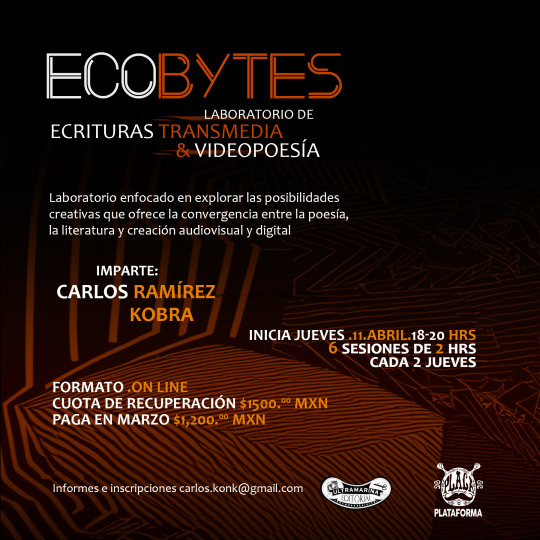
View On WordPress
0 notes
Text
MP - Jodi.org research
LO1
Jodi.org is a BENELUX art collective that specialises in creating net art which is performative in the sense that sourcing the content is randomised whenever you attempt to search for it with a variety of different websites. They also produce game designs as part of their practice.
'Jodi’s game modification approach is deconstructing the game to its basic parts and reassembling it in ways that do not make intuitive sense.'
'Their most well-known art piece is their website wwwwwwwww.jodi.org, made in basic HTML. Their notorious CD-rom OSS/**** (Mediamatic, Amsterdam 1998)made some noise as after installation, it executes a takeover of the computer. Other famous works include Global Move (2003), where they used the mapping site Google Maps and Sk8monkey on Twitter (2010), where the user of the work makes status updates to the Twitter network by literally using the computer’s custom-built keyboard as a skateboard. Their works were part of exhibitions like Netconditions at the ZKM at Karlsruhe, The Allure of the Digital at the Tate Gallery in London, and the SONAR festival in Barcelona, Transmediale in Berlin, and Deathmatch at Hangar in Barcelona. In 2000 they released their unusual way of thinking on “Page 379” on the occasion of the 25th anniversary of this medium.'
youtube
The works in this video, especially the installation of the works, are particularly interesting to me. The method of having multiple screens alongside a walkway could be an effective way of displaying digital works with an interactive, human element.
0 notes
Text
Leituras da semana (#03 // Fev 05, 2024)
Cory Doctorow: My McLuan lecture on enshittification [pluralistic.net]
No Pluralistic pode ser lido o discurso completo de Doctorow no festival Transmediale em Berlim - e vale bem a pena, para se perceber um pouco do estado/estrago actual da Internet, com algumas pistas do que poderá ser feito para corrigir isso.
Cory Doctorow: I assure you, an AI didn't write a terrible "George Carlin" routine [pluralistic.net]
Eu disse há duas semanas que Doctorow seria presença assídua nestas sugestões de leitura. Este artigo sobre uma das várias polémicas recentes a propósito de inteligência artificial generativa devia ser leitura obrigatória para quem se interessar pelo tema.
Ada Palmer: Tools for Thinking About Censorship [Ex Urbe]
Dado o caldo social, político e económico no qual todos nos encontramos a cozer em lume brando, este longo ensaio de Ada Palmer sobre censura é mesmo muito pertinente.
Sherryl Vint: A Century of Science Fiction That Changed How We Think About the Environment [Pocket]
Quem quiser uma lista de leitura de ficção científica ambiental/ambientalista/ecologista não precisa de ir mais longe - Sherryl Vint recua aos primórdios da ficção científica para demonstrar como o meio ambiente (da Terra ou de outros planetas) sempre foi um tema central ao género.
Gita Jackson: It Happened To Me: I Was a Daily Video Game Blogger [Aftermath]
Tendo sido jornalista já durante a época de declínio da profissão, mas ainda antes da devastação algorítmica que viria a conhecer, este artigo autobiográfico de Gita Jackson disse-me imenso. E engane-se quem pensa que relatos deste tipo estão confinados ao jornalismo temático/sectorial.
0 notes
Text
Kickstarting “The Bezzle” audiobook, sequel to Red Team Blues
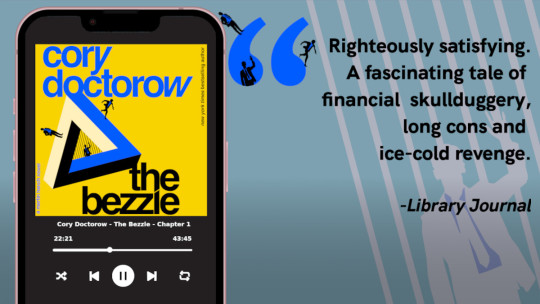
I'm heading to Berlin! On January 29, I'll be delivering Transmediale's Marshall McLuhan Lecture, and on January 30, I'll be at Otherland Books (tickets are limited! They'll have exclusive early access to the English edition of The Bezzle and the German edition of Red Team Blues!).

I'm kickstarting the audiobook for The Bezzle, the sequel to last year's Red Team Blues, featuring Marty Hench, a hard-charging, two-fisted forensic accountant who spent 40 years in Silicon Valley, busting every finance scam hatched by tech bros' feverish imaginations:
http://thebezzle.org
Marty Hench is a great character to write. His career in high-tech scambusting starts in the early 1980s with the first PCs and stretches all the way to the cryptocurrency era, the most target-rich environment for scamhunting tech has ever seen. Hench is the Zelig of tech scams, and I'm having so much fun using him to probe the seamy underbelly of the tech economy.
Enter The Bezzle, which will be published by Tor Books and Head of Zeus on Feb 20: this adventure finds Marty in the company of Scott Warms, one of the many bright technologists whose great startup was bought and destroyed by Yahoo! (yes, they really used that asinine exclamation mark). Scott is shackled to the Punctuation Factory by golden handcuffs, and he's determined to get fired without cause, so he can collect his shares and move onto the next thing.
That's how Scott and Marty find themselves on Catalina island, the redoubt of the Wrigley family, where bison roam the hills, yachts bob in the habor and fast food is banned. Scott invites Marty on a series of luxury vacations on Catalina, which end abruptly when they discover – and implode – a hamburger-related Ponzi scheme run by a real-estate millionaire who is destroying the personal finances of the Island's working-class townies out of sheer sadism.
Scott's victory is bittersweet: sure, he blew up the Ponzi scheme, but he's also made powerful enemies – the kinds of enemies who can pull strings with the notoriously corrupt LA County Sheriff's Deputies who are the only law on Catalina, and after taking a pair of felony plea deals, Scott gets the message and never visits Catalina Island again.
That could have been the end of it, but California's three-strikes law – since rescinded – means that when Scott picks up one more felony conviction for some drugs discovered during a traffic stop, he's facing life in prison.
That's where The Bezzle really gets into gear.
At its core, The Bezzle is a novel about the "shitty technology adoption curve": the idea that our worst technological schemes are sanded smooth on the bodies of prisoners, mental patients, kids and refugees before they work their way up the privilege gradient and are inflicted on all of us:
https://pluralistic.net/2023/04/12/algorithmic-wage-discrimination/#fishers-of-men
America's prisons are vicious, brutal places, and technology has only made them worse. When Scott's prison swaps out in-person visits, the prison library, and phone calls for a "free" tablet that offers all these services as janky apps that cost ten times more than they would on the outside, the cruelty finds a business model.
Working inside and outside the prison Marty Hench and Scott Warms figure out the full nature of the scam that the captive audience of prisoners are involuntary beta-testers for, and they discover a sprawling web of real-estate fraud, tech scams, and offshore finance that is extracting fortunes from the hides of America's prisoners and their families. The criminals who run that kind of enterprise aren't shy about fighting for what they've got, and they're more than happy to cut some of LA County's notorious deputy gangs in for a cut in exchange for providing some kinetic support for the project.
The Bezzle is exactly the kind of book I was hoping I'd get to write when I kicked off the Hench series – one that decodes the scam economy, from music royalties to prison videoconferencing, real estate investment trusts to Big Four accounting firm bogus audits. It's both a fast-moving, two-fisted crime novel and a masterclass on how the rich and powerful get away with both literal and figurative murder.
It's getting a big push from both my publishers and I'll be touring western Canada and the US with it. The early reviews are spectacular. But despite all of this, I had to make my own audiobook for it, which I'm pre-selling on Kickstarter:
http://thebezzle.org
Why? Because Audible – Amazon's monopoly gatekeeper to the audiobook world, with more than 90% of the market – refuses to carry my work.
Audible uses Digital Rights Management to lock every audiobook they sell to their platform. Legally, only an Audible-authorized app can decrypt and play the audiobooks they sell you. Distributing a tool that removes Audible DRM is a felony under Section 1201 of the 1998 DMCA.
That means that if you break up with Audible – delete your Audible apps – you will lose your entire audiobook library. And the fact that you're Audible's hostage makes the writers you love into their hostages, too. Writers understand that if they leave the Audible platform, their audience will have to choose between following them, or losing all their audiobooks.
That's how Audible gets away with abusing its performers and writers, up to and including the $100m Audiblegate wage-theft scandal:
https://www.audiblegate.com/
Audible can steal $100m from its writers…and the writers still continue to sell on the platform, because leaving will cost them their audience.
This is canonical enshittification: lock in users, then screw suppliers. Lots of companies abuse DRM to do this, but none can hold a candle to Amazon, who understand that the DMCA is a copyright law that protects corporations at the expense of creators.
Under DMCA 1201 commercial distribution of a "circumvention device" carries a five-year prison sentence and a $500,000 fine. That means that if I write a book, pay to have it recorded, and then sell it to you through Audible, I am criminally prohibited from giving you the tool to take it from Audible to another platform. Even though I hold the copyright to that work, I would face a harsher sentence than you would if you simply pirated the audiobook from some darknet site. Not only that: if you shoplifted the audiobook in CD form, you'd get a lighter sentence than I, the copyright holder, would receive for giving you a tool to unlock it from Amazon's platform! Hell, if you hijacked the truck that delivered the CD, you'd get off lighter than I would. This is a scam straight out of a Marty Hench novel.
This is batshit. I won't allow it. My books are licensed on the condition that they must not be sold with DRM. Which means that Audible won't sell my books, which means that my publishers are thoroughly disinterested in paying thousands of dollars to produce audiobooks of my titles. A book that isn't sold in the one store than accounts for 90% of all sales is unlikely to do well.
That's where you come in. Since 2020, I've used Kickstarter to pre-sell five of my audiobooks (I wrote nine books during lockdown!). All told, I've raised over $750,000 (gross! but still!) on these crowdfunders. More than 20,000 backers have pitched in! The last two of these books – The Internet Con and The Lost Cause – were national bestsellers.
This isn't just a way for me to pay off a lot of bills and put away something for retirement – it's proof that readers care about supporting writers and don't want to be locked in by a giant monopolist that depends on its drivers pissing in bottles to make quota.
It's a powerful message about the desire for something better than Amazon. It's part of the current that is driving the FTC to haul Amazon into court for being a monopolist, and also part of the inspiration for other authors to try treating Amazon as damage and routing around it, with spectacular results:
https://www.kickstarter.com/projects/dragonsteel/surprise-four-secret-novels-by-brandon-sanderson

And I'm doing it again. Last December, I went into Skyboat Media's studios where Gabrielle De Cuir directed @wilwheaton, who reprised his role as Marty Hench for the audiobook of The Bezzle. It came out amazing:
https://archive.org/details/bezzle-sample
Now I'm pre-selling this audiobook, as well as the ebook and hardcover for The Bezzle. I'm also offering bundles with the ebook and audiobook for Red Team Blues (naturally these are all DRM-free). You can get your books signed and personalized and shipped anywhere in the world, courtesy of Book Soup, and I've partnered with Libro.fm to deliver DRM-free audiobooks with an app for people who don't want to mess around with sideloading.
I've also got some spendy options for high rollers. There's three chances to name a character in the next Hench novel (Picks and Shovels, Feb 2025). There's also five chances to commission a Hench short story about your favorite tech scam, and get credited when the story is published.
The Kickstarter runs for the next three weeks, which should give me time to get the hardcopy books signed and shipped to arrive around the on-sale date. What's more, I've finally worked out all the post-Brexit kinks with shipping my UK publisher's books to EU backers. I'm working with Otherland Books to fulfill those EU orders, and it looks like I'm going to be able to sign a giant stack of those when I'm in Berlin later this month to give the annual Marshall McLuhan lecture at the Canadian embassy:
https://transmediale.de/en/2024/event/mcluhan-2024
Red Team Blues and its sequels are some of the most fun – and informative – work I've done in my quarter-century career. I love how they blend technical explanations of the scam economy with high-intensity technothrillers. That's the the same mix as my bestselling YA series Little Brother series – but these are firmly adult novels.
The Bezzle came out great. I hope you'll give it a try – and that you'll come out to see me in late February when I hit the road with the book! Here's that Kickstarter link again:
http://thebezzle.org

If you'd like an essay-formatted version of this post to read or share, here's a link to it on pluralistic.net, my surveillance-free, ad-free, tracker-free blog:
https://pluralistic.net/2024/01/10/the-bezzle/#marty-hench
#pluralistic#kickstarter#audible#the bezzle#bezzles#prison tech#disciplinary technology#crowdfunding#wilw#wil wheaton#audiobooks#publishing#science fiction#marty hench#martin hench#red team blues#shitty technology adoption curve#reits
661 notes
·
View notes
Video
youtube
transmediale McLuhan Lecture 2024 with Cory Doctorow and Frederike Kaltheuner.
1 note
·
View note
Text
Exhibition: „Leise-Park” #nfcdab2024 6th Ed.

This is one you can't miss!!! We always prefer the low-cost guerrilla style. Near-Field Communication Digital Art Biennale aka #nfcdab presents the anniversary edition: #nfcdab2024 6th Ed. Berlin - "Leise-Park". We cordially invite you to the craziest and most legendary #nfcdab shows! We have finally arrived in Berlin! - In the frame of the Vorspiel / transmediale & CTM.
Important!!! All works will be presented via QR codes, you must have an active Internet and the ability to read QR codes to connect!
Vernissage and curatorial guided tour:
2 February 2024 2.00 – 3.00 PM
Open:
2 February 2024, 1.00 PM - 5 PM
3 – 4 February 2024, 8.00 AM - 5.00 PM
Leise-Park:
Heinrich-Roller-Straße 24, 10405 Berlin (DE)
Artists and art projects:
Adrian Pickett, Andrea Roccioletti, Andreas Maria Jacobs, Angy Vardalou, Anna Pinkas, Anna Utopia Giordano, AK Ocol, Ayshe Kizilçay - KiAy, Benna Gaean Maris, Bjørn Magnhildøen, Blazir, Bruce Barber, Bruno Melo, Bya de Paula, Dave Greber, Davey Whitcraft, Đurđija Vucinic, Elaine Crowe, James Hutchinson, Karl Heinz Jeron, Klaus Pinter, Marc Lee, Max Herman, Nico Vassilakis, Nicole Kouts, Oli Olinski, Osvaldo Cibils, Peter Kusek, Ricardo F. Bodini, Rudy Paganini - forevermidi_com, Shin Jungkyun, Stefanie Reling-Burns, Tiz Creel, Zsolt Mesterhazy, and #DUMPHAUS - Curated by Catalina Vallejos and Ronnie Karfiol - Artist: Featuring Deatxwish, Taiki Arita, Tiến Nguyễn, Trí Thiện, Lê Duy, Xuân Minh, Gia Huy, Flounder Lee, Martina Noskova, Idklang, Aaporia, Magdi Mostafa, Jialun Wang, Hiroshi Murakami, David Longshaw, Athina Kanellopoulous, Ioana & Pablo, The Mainstream Official, Oksana Rudko, Liu Chang, Chloe Cheuk, Kayoko Nakamura, Aleksei Martyniuk, Blanche The Vidiot, F.C. Zuke, Nina Sumarac, Giuseppe De Benedittis, Ania Urbanski, Contaminated Carcass, Jaimerative Art.

This year we are celebrating the 10th anniversary of the #nfcdab project, which could not exist without the trust of the artists. The idea was born at a time when not everyone was aware of the coming revolution in the reception of digital content caused by the advent of smartphones. In 2014, QR codes or NFC tags were a technology on the verge of becoming commonplace, and the same was true of wireless Internet and unfettered access to the Internet. 10 years later, we are in very different times. That's why we trusted the idea of DIWO, which is an important element of this - let's not be afraid to use the word: "research" project. The whole concept would not have been possible thanks to the help from browserbased.org and noemata.net in the persons of Zsolt Mesterhazy and Bjørn Magnhildøen, I must also mention Brian Khuu being our Australian liaison to the antipodes, and I want to thank the many people who have helped us over the years in organizing our shows: Konstantina Mavridou, Radovan Misovic aka Rad0, Tibor Horvath, Florian Kuhlmann.
More info:
https://vorspiel.berlin/events/nfcdab2024-6th-ed-berlin-leise-park-ausstellung
Supervisor and concept of the exhibition: Dominik Podsiadly
Organizers: #nfcdab - Dominik Podsiadly, noemata - Bjørn Magnhildøen, BrowserBased - Zsolt Mesterhazy.
Hashtags: #nfcdab #nfcdab2024 #leisepark
3 notes
·
View notes
Quote
immutability constantly seeks to secure a contingent claim to power. Perhaps, conversely, the challenge to power is found in the contestation of its immutability and the tools that instrumentalise its solidification. Considering contemporaneous claims to truths and the apparent impossibility of proving their veracity, we would like to put forward the notion of narration (a long-time stronghold of design) as a locus of power enaction. Thus, where design operates in collusion with power towards the domination of a specific narrative by way of shaping and governing truth.
transmediale | Immutability, Management, Trees
0 notes
